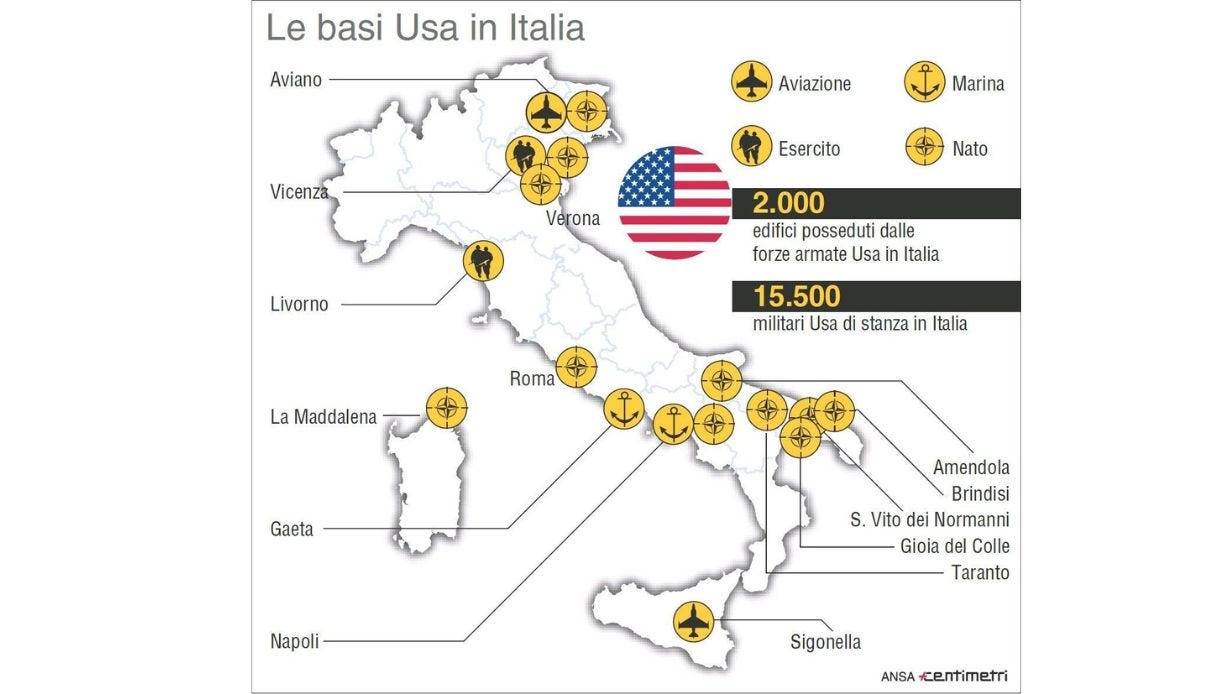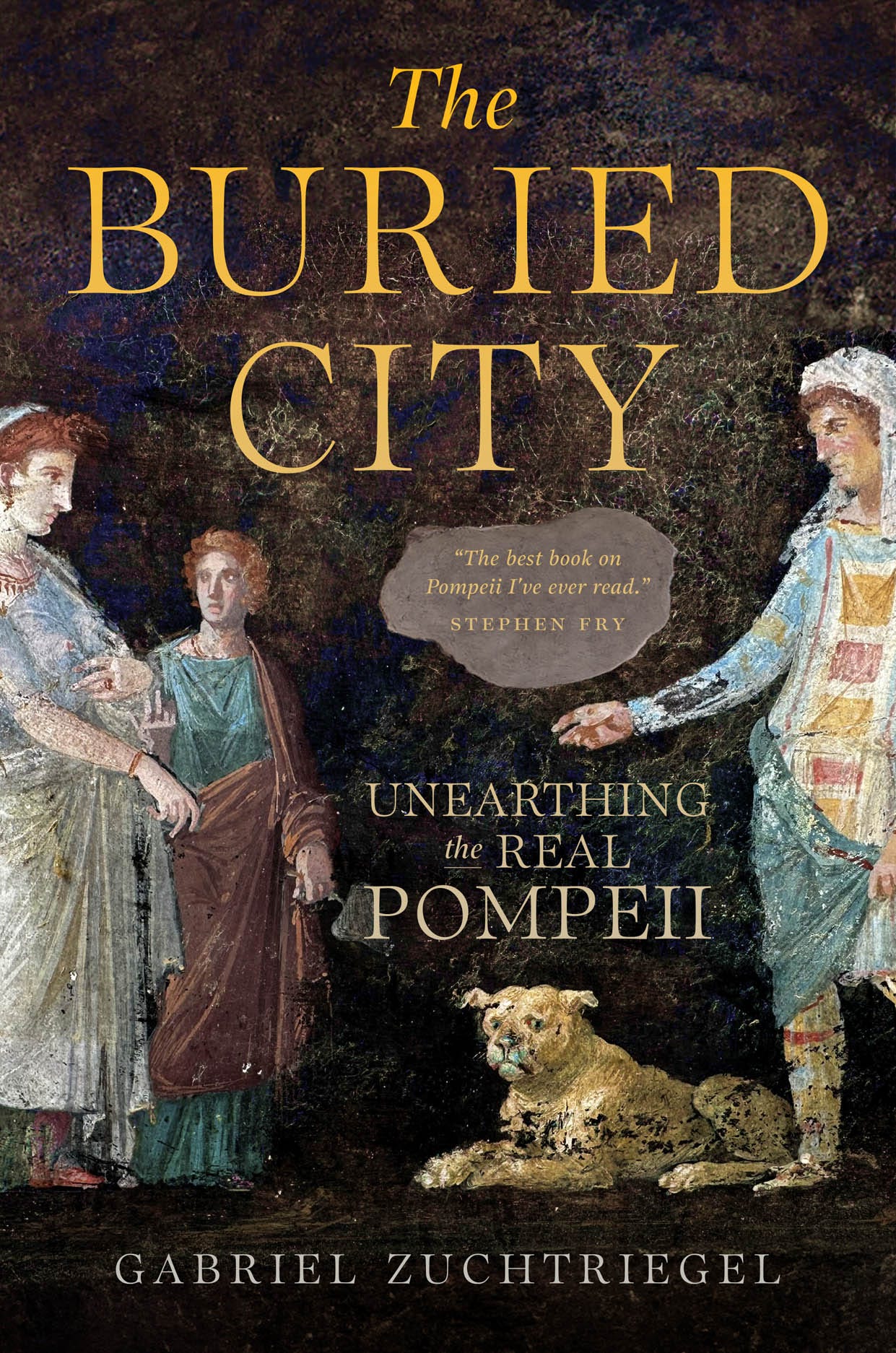Last Sunday I awoke to the noise of supersonic jets flying over my house. One after the other after the other. A few minutes later, looking out of my window, I spotted a miliary helicopter circling over my local belltower, heavily armed with large missiles. What was going on? Opening my laptop I soon discovered, like many millions, that the U.S. had begun a campaign of bombing in Iran. The aircraft had presumably been launched from a nearby base to engage in emergency exercises. There is too much to say about the wider geopolitics: the history of Europe’s imperial aggression in Iran, the nature of our current (mis)information, the absence of Western Iranian voices in public debate. For these matters, Kamin Mohammadi is my go-to source. Here, for obvious reasons, I will limit myself to Italy’s official response. In a speech on Tuesday, PM Giorgia Meloni labelled U.S. strikes as having “further destabilized an already fragile region”, though she stopped short of criticising Trump directly. She called on Europeans to “make a global difference together” (a funny thing to hear from anti-EU populist-nationalist-sovereigntist). She even labelled Israel’s actions in Gaza as “dramatic and unacceptable”; tepid words certainly, but arguably her clearest condemnation yet. Antonio Tajani, Italy’s foreign minister, quickly set up meetings with allies in Saudi Arabia, the UAE, and Qatar, to ensure Italy’s vulnerable gas imports “will not be affected” whatever happens next. Guido Crosetto, the defence minister, guaranteed that “there will never be Italian soldiers or planes that will bomb Iran”, insisting there’s “no political will” and that it would be “constitutionally impossible.” Unfortunately, this is far from reassuring. There are still eight American bases in Italy, and around 15,000 soldiers are based in the country. While Meloni has told her peers that any use of these bases to strike Iran would require a vote in parliament, I’m afraid it is by no means clear that the current U.S. administration would respect these conditions or that the Italian PM really has the power to call the shots here.

September 1943. Allied forces are making their way up the Italian peninsula to liberate the country from the Nazi occupation. Meanwhile, German forces are on the retreat, rampaging through small towns, killing civilians and setting off bombs to hamper the resistance and take revenge on all those they deem traitors. Against this backdrop, the writer and journalist Alba de Céspedes fled from her home in Rome together with a handful of her comrades to take refuge in the Puglian city of Bari where she worked as a presenter for a partisan radio station. Last month, Ann Goldstein, the esteemed translator of Céspedes’s novels, published the first tranche of a new collection of the author’s broadcasts from that period, and, even (perhaps especially) today, they are an important testimony of the realities of war. Céspedes directs her speech at women, at all those “waiting for the return of their men”; woman who “have remained locked in the darkness of separation, without news, without promises.” Her words are rhetorically and poetically powerful, but they’re also, above all, valuable documentary materials that attest to the lesser-known struggles of enduring conflict. The New Yorker has just published a selection from Goldstein’s upcoming collection, so check them out here.
Turin - the capital of Piemonte - is to my mind one of the absolute best places to eat and drink in Italy. I know this is a big claim, but having visited the city year after year on an annual culinary pilgrimage, I stand by it. When most people think of Turin they think of beef and cheese, pasta and truffles. That’s more than valid, but it only captures a fraction of what the city really offers. Last week the Guardian’s Liz Boulder travelled around Turin with Savio Losito, co-founder of the unexpected Italy app, and she’s done a great job of communicating the broader food scene. I for one endorse the selections. There’s Scannabue for elegant classics at extraordinarily cheap prices, Consorzio for creative vegetable and offal dishes, Le Vitel Etonne for antipasti and French-inspired small plates, and so on. Then, of course, there’s the wine and the vermouth from places like eccetera, which Boulder rightly defines as one of the best aperitivo experiences in the country. If you still think of Turin as a winter destination, it might be time to reconsider. With its green spaces, relatively mild climate, and great food scene, I think this city is a perfect for a midsummer city break. Need more evidence? Click here.
Arts and culture: archaeology for all
Back in 2021 the Italian Cultural Ministry appointed 39-year-old German-born Gabriel Zuchtriegel as Director of the Pompeii archaeological park. Academics, scholars and curators were outraged. Critics claimed the man was too inexperienced, that his politics were questionable, that he lacked the gravitas to manage such an important heritage site. Well, four years on, Zuchtriegel is still there and even his naysayers are starting to change their tune. This month he released a book The Buried City: Unearthing the Real Pompeii which is, in effect, a manifesto of contemporary archaeological practice. Pompeii, argues Zuchtriegel, should be less about historical abstraction and technical academicism, and more about everyday life. Visitors, he points out, are most interested in the food, the inhabitants’ sex lives, their domestic rituals, their pets, and there is nothing at all “wrong” with that. In his book he therefore calls for a “populist” approach to heritage management, putiing the visitor experience (back) at the centre of the site, and I have to say I am broadly sympathetic with his vision. Peter Stothard has published a fascinating overview of the arguments over at the TLS which I really recommend reading. You can also publish the book directly from the publisher here if you’re interested.
OK time for something silly: over the past couple of weeks the self-styled Italo Disco duo Mind Enterprises has been entertaining the world on social media with a series of 80s inspired nostalgic mixes. Andrea Tirone and Roberto Conigliaro seem to have taken global crisis in its stride and, after a few years of releasing niche records, they’ve set themselves the admirable task of cheering us all up with nuggets Italian summer disco party vibes. In the past few days alone Mind Enterprises has accrued hundreds of thousands of interactions on TikTok and Instagram; so even if this isn’t your thing it’s therefore surely of anthropological interest. What is it about Italo disco that inspires so many people? What is it about two men in garish t-shirts and awful pants grooving awkwardly that is so mesmerising? The answer, obviously, isn’t that complicated: Mind Enterprises is a call to liberty, to living in the moment, to hedonism, to fun; the performance is a heady mix of unashamed branding, nerdy obsession, and genuine passion. A potent cocktail for the dark times we’re living through indeed. Follow the duo here to keep up with their latest sessions.
Recipe of the Week: Amalfi lemon sorbetto
Warning: This week’s recipe is not one for amateur ice cream makers. If you aren’t armed with a gelatiera, if you don’t have easy access to specialist ingredients, then I’m afraid this one is not for you. If you do have the experience, however, and you’re ready to level up your sorbet game, then I’ve got a real treat. This is it. The definitive recipe for making lemon sorbetto, just as you’d find it along the Campanian coastline. The lemons here really do have to be Amalfi lemons, which are sweeter and more balanced than just about any other variety. You’re also going to need two other ingredients: carob powder, which adds density to the mix, and powdered glucose, which binds the flavours together. This might all sound like a faff to get together, which it is. The good news is that once you’ve done your shopping, the whole thing requires about five minutes of cooking, plus cooling time. With a little planning you can therefore prep yourself Italy’s quintessential summer dolce to the highest possible level and all in the comfort of your home. I’ve been searching for about ten years for this recipe, so trust me this is the real deal. Here’s the link [ITA only].
I’m Jamie Mackay, a UK-born, Italy-based writer, working at the interfaces of journalism, criticism, poetry, fiction, philosophy, travelogue and cultural-history. I set up ‘The Week in Italy’ to make a space to share a regular overview of the debates and dilemmas, innovations and crises that sometimes pass under the radar of our overcrowded news feeds, to explore politics, current affairs, books, arts and food. If you’re a regular reader, and you enjoy these updates, I hope you’ll consider becoming a supporter for EUR 5.00 per month. I like to think of it as a weekly catch-up chat over an espresso. Alternatively, if you’d like to send a one-off something, you can do so via PayPal using this link. Grazie!






